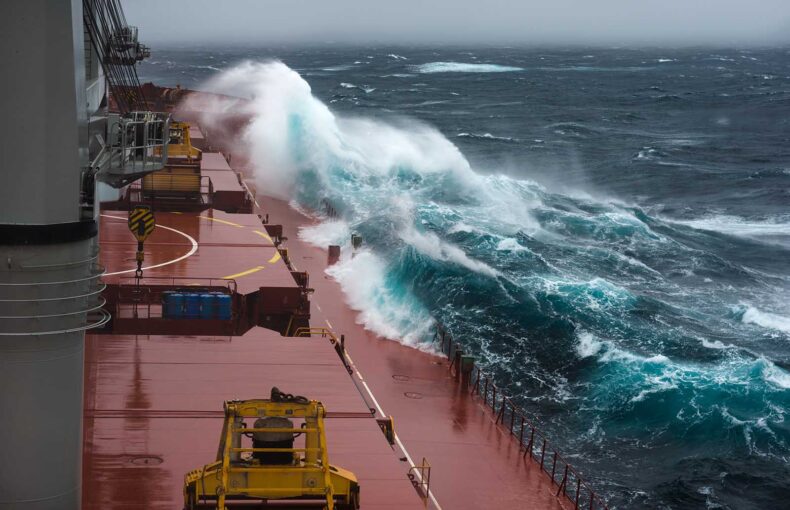Navigating risk: How AIS data enhances maritime insurance operations and compliance analytics
- What is the impact of marine insurance on the global economy?
- Compliance monitoring and the importance of adherence to maritime regulations
- Which role does AIS data plays in maritime insurance underwriting?
- How does both, AIS and maritime weather data, help insurance companies with their claim management?
- Learn more about Spire Maritime's AIS data sets
In the ever-changing landscape of maritime insurance, staying ahead of risks is paramount.
When every vessel voyage poses unique challenges, insurers rely on a multitude of compliance analytics tools and data sources to navigate the complexities of the maritime industry. Among these indispensable resources, AIS data stands out as a must-have source of information, empowering predictive analytics for insurance and compliance companies. Beyond its traditional role in underwriting, AIS data has emerged as a fundamental element of modern maritime insurance operations, empowering insurers with comprehensive visibility and actionable intelligence.
What is the impact of marine insurance on the global economy?
Marine insurance is a crucial pillar in global commerce, shielding vessels, cargo, and businesses from the inherent risks of maritime trade. With over 90% of global trade reliant on maritime transport, the significance of marine insurance cannot be overstated. The maritime industry is facing greater challenges than ever before due to unpredictable events, such as increasing extreme weather conditions, droughts, wars, and piracy activity. Considering these events, marine insurance is crucial as it provides a safety net for stakeholders, encouraging investment, and facilitating international transactions. Moreover, it bolsters operational stability by promptly compensating for losses, and ensuring minimal disruption to supply chains. By fostering regulatory compliance and promoting safety and environmental standards, maritime insurance not only safeguards against uncertainties but also sustains the long-term growth and stability of the maritime sector and related industries.
Compliance monitoring and the importance of adherence to maritime regulations
Compliance with maritime regulations is crucial for the insurance industry in several ways. Firstly, adherence by vessels and maritime companies to regulations helps mitigate risks associated with vessel operations, reducing the likelihood of accidents, injuries, and environmental incidents. Insurers often base their underwriting decisions and premium calculations on the level of regulatory compliance maintained by vessel owners and operators. Non-compliance with regulations may result in increased insurance premiums or even the denial of coverage altogether. Secondly, regulatory compliance demonstrates a commitment to safety and environmental protection. Insurers may offer preferential terms or discounts to vessel owners that maintain a strong compliance record, reflecting lower risk profiles. Lastly, compliance with regulations minimizes the potential for legal liabilities and fines, protecting both vessel owners and insurers from costly legal disputes and financial losses.
AIS data is essential to check a vessels’ compliance with maritime regulations as it provides tracking of its movements, verifying adherence to navigation rules, environmental laws, and safety standards, while also monitoring for anomalies such as ship-to-ship transfers, suspected illicit activities, voyage irregularities, and identity tampering. Those that want to reach the next level of digitisation in the marine insurance sphere make the most of Spire’s extensive Historical AIS data set which has vessel movements dating back to 2010. This data enables retrospective analysis for investigations into past incidents, assessment of compliance over time, and the possibility of training machine learning models empowering insurers to issue predictive premiums.
Which role does AIS data plays in maritime insurance underwriting?
In order to effectively evaluate marine risk and make informed decisions in light of increasing challenges, underwriters need comprehensive visibility into the risk associated with each shipment, as well as insights into the fleets and cargo on board. However, the industry often grapples with information gaps, as it frequently relies on data provided by its clients.
AIS data therefore plays a pivotal role in both the maritime insurance and compliance industries, serving as an important and independent source of information for assessing risks, and ensuring regulatory compliance. By continuously broadcasting vessel positions, speeds, directions, and other relevant information, AIS provides a real-time view of vessel activities worldwide. This rich dataset allows insurers to monitor vessel movements and assess risk factors with unprecedented accuracy and granularity, enabling more accurate risk assessment and underwriting decisions.
AIS data also provides a wealth of information on past vessel activities, allowing insurers to identify trends, patterns, and risk factors over time. By analyzing Historical AIS data, with Spire Maritime’s Historical AIS serving as the most complete Historical AIS vessel tracking data since 2010, insurers gain insights into vessel behavior in specific regions of interest, assess the frequency and severity of incidents, and identify areas prone to accidents.
As such, Historical AIS data is a valuable resource for training machine learning models to identify trends and empower predictive analytics for the maritime insurance industry. These models can leverage historical vessel movements, incidents, and fuse it with claims data to improve risk assessment, claims prediction, fraud detection, and underwriting optimization. By analyzing patterns and trends in AIS data, machine learning models can help insurers refine their risk models, adjust pricing strategies, and tailor insurance policies to better reflect the actual risk exposure of insured vessels, leading to reduced losses and improved profitability in the maritime insurance market.
Concirrus, for example, is implementing artificial intelligence and machine learning to help its customers in the insurance market gain a step-change competitive advantage, and develop new and innovative insurance products using Spire’s Satellite AIS data.
How does both, AIS and maritime weather data, help insurance companies with their claim management?
Following the underwriting process, when vessels are insured, the use and need for AIS data remains instrumental for insurers. By leveraging AIS data, insurers can accurately reconstruct the events leading up to an incident, such as collisions, groundings, or cargo losses, facilitating prompt and thorough claims investigations. Additionally, AIS data enables insurers to verify vessel positions, speeds, and routes at the time of the incident, validating the accuracy of claims and preventing fraudulent activities. Moreover, AIS data can aid in assessing liability and apportioning responsibility among parties involved in an incident, helping insurers expedite claims processing and settlement.
Maritime weather data emerges as another indispensable asset for maritime insurance claim management, owing to its substantial influence on vessel operations and safety. Inclement weather conditions, such as storms, high winds, and fog, can increase the risk of accidents, collisions, and cargo damage. By analyzing historical weather data, insurers can assess the impact of weather conditions on maritime activities leading up to an incident, anticipate potential risks, and adjust insurance policies accordingly.
Overall, AIS and maritime weather data enhances transparency, efficiency, and accuracy in maritime insurance claim management, enabling insurers to mitigate losses and deliver better outcomes for policyholders.
Learn more about Spire Maritime’s AIS data sets
Get in touch with us for more information on Standard Satellite AIS, Real-time AIS or Historical AIS, some of which are unique data solutions only available from Spire Maritime.
Alternatively visit our page dedicated to the use of AIS for the insurance and compliance industries.
 Written by
Written by


